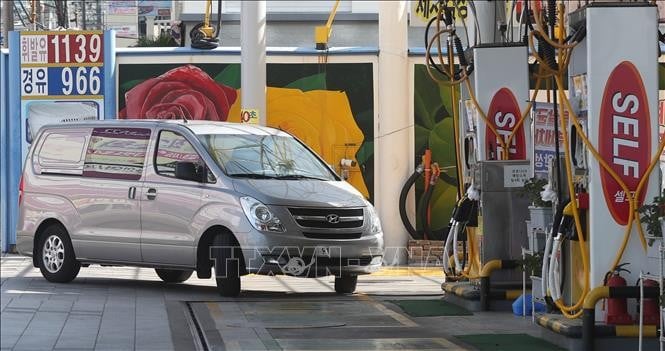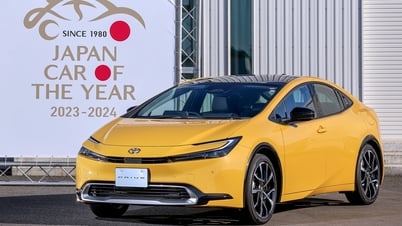South Korea recorded its first-ever decline in the total number of registered fuel-powered vehicles in 2023, the Ministry of Land, Infrastructure and Transport said on January 19.
 |
| A gas station in Changwon, South Gyeongsang Province, South Korea. (Source: Yonhap) |
Specifically, the total number of registered vehicles running on gasoline, diesel and liquefied petroleum gas in 2023 decreased by 85,000 vehicles (0.4%) compared to the previous year, to 23.647 million vehicles. This is the first time this statistic has decreased since the early 1960s, mainly due to the number of diesel and liquefied petroleum gas vehicles falling, although the number of registered vehicles running on gasoline increased by 2%.
The Korean government 's policies to reduce pollution caused by vehicles are believed to be one of the reasons for the decline. Accordingly, it will remove old vehicles to reduce the risk of pollution, especially diesel vehicles; apply operating restrictions in Seoul and provide financial incentives for vehicle owners to remove high-emission vehicles.
In 2023, total vehicle registrations – including conventional and eco-friendly models – will increase by 1.7% to 25.49 million, of which eco-friendly vehicles will account for 2.12 million. In this category, hybrid vehicles will account for about 72%, electric vehicles for about 26%, and hydrogen-powered vehicles and other vehicles for the remaining 2%.
The eco-friendly segment grew to a total of 2.12 million registrations, up 33.4% year-on-year. This included 154,000 electric vehicles (up 39.5%), 46,000 hydrogen vehicles (up 15.6%) and 372,000 hybrid vehicles (up 31.7%).
The South Korean government has been gradually withdrawing its support for hybrid vehicles. Subsidies for hybrid purchases ended in 2019 and subsidies for plug-in hybrids ended in early 2021. By 2025 or 2026, South Korea will phase out hybrids as an eco-friendly vehicle.
An official in the Korean electric vehicle industry said the electric vehicle industry is a promising industry, but this is also a time when electric vehicle manufacturers are facing more challenges as many countries have begun to limit or eliminate preferential policies for electric vehicle buyers of foreign brands, including Korean brands.
Source





![[Photo] President of the Cuban National Assembly visits President Ho Chi Minh's Mausoleum](https://vphoto.vietnam.vn/thumb/1200x675/vietnam/resource/IMAGE/2025/10/1/39f1142310fc4dae9e3de4fcc9ac2ed0)
![[Photo] Keep your warehouse safe in all situations](https://vphoto.vietnam.vn/thumb/1200x675/vietnam/resource/IMAGE/2025/10/1/3eb4eceafe68497989865e7faa4e4d0e)
![[Photo] Hanoi morning of October 1: Prolonged flooding, people wade to work](https://vphoto.vietnam.vn/thumb/1200x675/vietnam/resource/IMAGE/2025/10/1/189be28938e3493fa26b2938efa2059e)



























































































Comment (0)